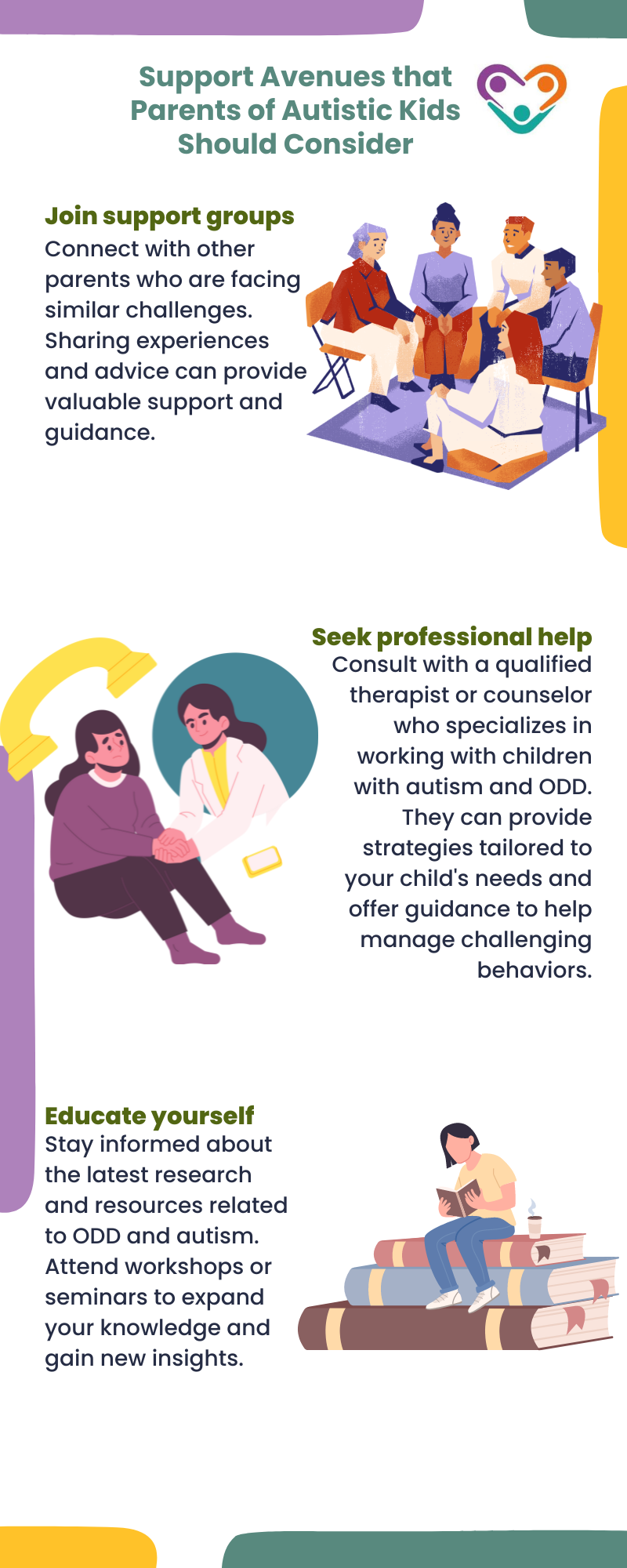Oppositional Defiant Disorder (ODD) is a behavioral disorder that affects a significant number of children and adolescents. It is characterized by a persistent pattern of defiant, disobedient, and hostile behavior towards authority figures.
ODD is typically diagnosed during childhood, with some children outgrowing it as early as 8 or 9 years old. It is more common in boys than in girls, with boys often displaying physical violence and intense outbursts, while girls may exhibit more indirect forms of defiance.
Here, we’re going to look at ODD in further detail.

Symptoms and Diagnosis of ODD
To be diagnosed with Oppositional Defiant Disorder (ODD), the symptoms must persist for more than 6 months and significantly impair the child’s daily functioning at home, school, or in social settings. Here are some of its most common symptoms:
- Frequent temper tantrums
- Arguing with adults
- Refusing to comply with rules and requests
- Deliberately annoying others
- Blaming others for their mistakes or misbehavior
- Easily annoyed or angered
- Vengeful or spiteful behavior
It is important to note that these symptoms should be present in multiple settings, not just at home or school, to be considered ODD.

Overlapping Conditions with ODD
That said, Oppositional Defiant Disorder (ODD) is often diagnosed alongside other disorders, such as ADHD, autism, learning disorders, conduct disorder (CD), bipolar disorder, or mood disorders like depression and anxiety.
In fact, individuals with a history of ODD have a 90% chance of being diagnosed with another mental illness during their lifetime, highlighting the importance of early diagnosis and intervention.
The coexistence of ODD with other conditions can complicate the diagnostic process and treatment planning.
For example, dual diagnoses of ODD and ADHD are common, and medications prescribed for ADHD can significantly reduce ODD symptoms. However, medications are not typically prescribed for ODD alone unless it coexists with another disorder on the autism spectrum.

The Connection Between ODD and Autism
When it comes to understanding Oppositional Defiant Disorder (ODD) in the context of Autism Spectrum Disorder (ASD), It is important to recognize the connection between autism and ODD in order to have a better understanding of what the condition is all about.
While they are distinct disorders, there are certain overlapping factors and challenges that individuals with autism and ODD may face.
According to research, children with autism are more likely to develop Oppositional Defiant Disorder (ODD) due to struggles with social understanding, sensory sensitivities, and the frustration of feeling misunderstood.
Undiagnosed autism or ADHD can resemble ODD symptoms, as autistic children might have reactions to sensory overload that can look like defiance, while kids with ADHD can be hyperactive.
Due to this, parents and caregivers should understand that these behaviors may be rooted in the underlying autism spectrum.
Unique Challenges for Individuals with Autism and ODD
When a child has both autism and ODD, it can be challenging to differentiate between the two conditions. Understanding the motivation behind the child’s behavior is key.
A child with ODD may act out intentionally and meanly, while a child with ASD may do so due to frustration with changes in routine or sensory issues, with genuine emotions and reactions.
It is crucial to consider the individual’s unique challenges and experiences when addressing their behavior.
Differentiating Between Autism and ODD Behaviors
Differentiating between the behaviors associated with autism and those associated with ODD can be complex. While both conditions may exhibit challenging behaviors, it is important to consider the underlying motivations and triggers for these behaviors.
Children with ODD may be more likely to exhibit intense outbursts or defiance toward people they know well, impacting their relationships with family members.
On the other hand, individuals with autism may struggle with social communication, sensory issues, and changes in routine, which can lead to behaviors that may resemble defiance.
To accurately differentiate between autism and Oppositional Defiant Disorder, it is essential to consult with a qualified healthcare professional who can conduct a thorough assessment and provide an accurate diagnosis. This will help guide appropriate interventions and strategies for managing the specific needs of the individual.

How to Manage ODD in Autism
When it comes to managing Oppositional Defiant Disorder (ODD) in individuals with Autism Spectrum Disorder (ASD), it’s important to implement effective strategies that address their unique needs and challenges.
Here are some strategies that parents and caregivers can follow:
Understand and Meet Your Child’s Needs
One of the first steps in managing ODD in Autism is to understand and meet your child’s needs. This involves recognizing the triggers that may lead to challenging behaviors and finding ways to address them.
For individuals with Autism, sensory sensitivities and difficulties with social understanding can contribute to ODD-like behaviors.
By creating an environment that accommodates their sensory needs and providing clear and consistent communication, caregivers can help reduce frustration and prevent outbursts.
It’s also important to establish routines and predictability, as changes in routine can be particularly challenging for individuals with autism and ODD. Providing visual schedules, using social stories, and offering choices can help individuals with Autism feel more in control and reduce the likelihood of oppositional behaviors.
Promote Positive Behavior and Learning
Promoting positive behavior and learning is essential in managing ODD in autism. Positive reinforcement techniques, such as praise, rewards, and token systems, can be effective in encouraging desired behaviors. It’s important to focus on the positive aspects of your child’s behavior and provide specific feedback.
For example, instead of saying “Good job,” you can say “Great job sharing your toys with your sibling!”
Implementing visual supports, such as visual schedules, social stories, and visual reminders of expectations, can help individuals with autism understand and follow rules and routines.
Clear and concise instructions, along with visual cues, can make it easier for individuals with autism to comprehend and remember what is expected of them.

Treatment Approaches for ODD
While there is no specific medication approved for ODD, there are certain types of medication that may be recommended based on the child’s underlying symptoms. The primary treatment approaches for ODD include the following:
Applied Behavioral Analysis (ABA) Therapy
Applied Behavioral Analysis (ABA) therapy is a widely recognized and evidence-based intervention for individuals with ODD.
This therapy focuses on identifying and modifying behaviors through positive reinforcement and consequences. ABA therapists work closely with individuals with ODD to develop strategies that promote positive behavior and reduce oppositional and defiant behaviors.
ABA therapy typically involves breaking down challenging behaviors into smaller, manageable steps. By systematically teaching and reinforcing appropriate behaviors, individuals with ODD can learn more adaptive ways of responding to difficult situations.
ABA therapy often includes the involvement of parents and caregivers to ensure consistency and generalization of skills outside of therapy sessions.

Social Skills Training
Social skills training is another valuable treatment approach for individuals with ODD. This type of therapy focuses on enhancing communication skills, problem-solving abilities, and interpersonal interactions. Through social skills training, individuals with ODD can develop the necessary skills to navigate social situations more effectively and reduce oppositional behaviors.
Social skills training programs may involve group therapy sessions, where individuals can practice and learn from one another in a supportive environment. The therapy may also include role-playing exercises, modeling appropriate behaviors, and providing feedback and reinforcement.
By improving social skills, individuals with ODD can enhance their relationships and experiences in various settings.
Medication
Although there is no specific medication approved for the treatment of ODD, in some cases, medication may be considered to manage symptoms that coexist with ODD. It is important to note that medication is not typically prescribed for ODD alone but rather for other conditions that may be present alongside ODD, such as ADHD or mood disorders.
Some of the medications that may be prescribed for individuals with ODD include:
- Anti-psychotics – To address aggressive or impulsive behaviors
- Anti-depressants – To manage co-occurring mood disorders
- Stimulant medication – To address symptoms of ADHD
The decision to use medication should be made in consultation with a healthcare professional who can assess the individual’s specific needs and consider the potential benefits and risks.
By utilizing a combination of treatment approaches, individuals with ODD can receive the support and strategies they need to manage their oppositional and defiant behaviors effectively.
The involvement of therapists, parents, and caregivers is crucial in implementing these approaches consistently and ensuring the best outcomes for individuals with ODD.
Seeking Support and Professional Help as a Parent
Parenting a child with ODD and autism can sometimes feel overwhelming. Remember that you are not alone, and seeking support is essential. Here are some avenues for support that you can consider:

Remember that each child is unique, and what works for one may not work for another. It may take time to find the strategies that work best for your child. Be patient, stay consistent, and celebrate small victories along the way.
With your love, support, and effective parenting techniques, you can help your child navigate the challenges of ODD and autism and promote positive growth and development.
If you’re seeking specialized ABA therapy in New Jersey, Indiana, Georgia, and New York, Golden Care offers comprehensive services tailored to meet the unique needs of each individual. Contact us to learn more or book a consultation today.
Sources:
https://blog.theautismsite.greatergood.com/oppositional-defiant-disorder
https://getgoally.com/blog/oppositional-defiant-disorder-and-autism
https://www.autism360.com/what-is-oppositional-defiant-disorder



